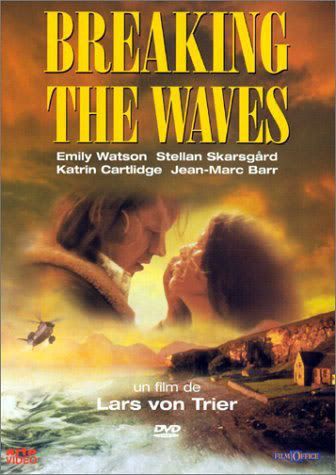Breaking the Waves (Lars von Trier, 1996)
 Lars von Trier is the master of making beautifully depressing films. Breaking the Waves is a perfect companion piece to Dancer in the Dark (or vice versa, actually) in its tragic, yet strangely optimistic, view of the world. Bess (played stunningly by Emily Watson in, get this, her first film role) is a ridiculously (but not unbelievably) naive, childlike Scotswoman who lives in an isolated village ruled by an almost medieval, Calvinist theocracy. She decides to marry an outsider, Jan, and almost immediately, he is called away to work on a ship, like many other Scots, and is paralyzed in an accident. Paralyzed from the neck down, Jan requests, then demands, that Bess sleep with other men and tell him about it, so he never loses the feeling of love. Although Bess is highly religious, she does this, because she believes God will heal Jan if she follows Jan's request. Things spin out of control from there, to the inevitable tragic conclusion; but, at the very end of the film, we are left with the feeling that Bess did, in fact, do the right thing, no matter what everyone else said. The acting and direction are both so wonderful, it's almost useless to talk about them. The film deals with such huge and heavy issues, but in such a way that you are wrapped up in the story in front of you while watching the movie, and only afterward do the issues slap you in the face. Bess is at once a child-woman, easily abused and manipulated; and a fighter, a woman who does what she thinks is right, no matter what the cost. Many have called von Trier a misogynist, and although in this film, there are scenes of violence against Bess that are almost unwatchable, I think that he makes believable and realistic female characters who deal with their flaws, instead of either saintly or terrible women found in so many other male filmmakers' films. Breaking the Waves is the first part in von Trier's "golden heart" trilogy, films that deal with essentially good women who are tried by the outside world. Another question the film raises is that of God, and of religion and morality, the whole deal: Who can say what is good? Who (but God, to Bess) can judge someone? The elders in the community exclude women and give them no say, and once Bess starts acting outside her role, she is excommunicated. Bess has frequent talks with God (she voices both parts, a very chilling effect), and she thinks that God approves of what she does for Jan. Who can tell her otherwise? Everyone in the film but Jan calls Bess stupid and weak, and only Jan can see her good qualities. What does this say about love, about religion, about life? So many amazing questions. von Trier, raised by Jewish Communists in a nudist colony, turned to Catholicism in 1995 in a form of rebellion. If Breaking the Waves is any sign, these questions are ones that engage him and make him stronger, and the audience, as well. A very interesting, controversial man, von Trier makes beautiful pictures, and this is his best. 9/10 RIYL: Festen (Dogme 95's true triumph, with similar themes of sex and family) Labels: 1996, lars von trier |

Comments on "Breaking the Waves (Lars von Trier, 1996)"
post a comment